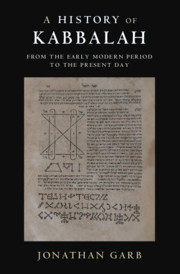Book contents
- A History of Kabbalah
- A History of Kabbalah
- Copyright page
- Dedication
- Contents
- Figures
- Acknowledgments
- Introduction
- 1 Premodern and Modern Kabbalah
- 2 The Safedian Revolution of the Sixteenth Century
- 3 The Kabbalistic Crisis of the Seventeenth Century
- 4 Canonization
- 5 Beginnings of Globalization
- 6 Destruction and Triumph
- 7 Recurrent Themes
- Appendix Timeline
- Glossary
- Bibliography
- Index
3 - The Kabbalistic Crisis of the Seventeenth Century
Published online by Cambridge University Press: 02 July 2020
- A History of Kabbalah
- A History of Kabbalah
- Copyright page
- Dedication
- Contents
- Figures
- Acknowledgments
- Introduction
- 1 Premodern and Modern Kabbalah
- 2 The Safedian Revolution of the Sixteenth Century
- 3 The Kabbalistic Crisis of the Seventeenth Century
- 4 Canonization
- 5 Beginnings of Globalization
- 6 Destruction and Triumph
- 7 Recurrent Themes
- Appendix Timeline
- Glossary
- Bibliography
- Index
Summary
While examining the theological, ideological and sociological dimensions of the Sabbatean messianic movement, and sketching its major figures, the chapter is aimed at uncovering less famous kabbalistic schools and movements in the seventeenth century. These go beyond the continued editing, formulation and influence of Safedian Kabbalah, with the philosophically oriented interpreters of Kabbalah in Italy being of special interest. Against the backdrop of the general crisis of the century and particularly the growing insecurity of European Jewry,the development of nationalistic Kabbalah, especially in Prague, especially its focus on the Land of Israel, is examined. The role played by Musar (self-perfection) literature and magic in popularizing Kabbalah, the reception of Christianized Kabbalah amongst elites in several Protestant countries complement the picture of the growing sway of this lore during the course of the century. However, the very success of Kabbalah also generated a range of critical responses, expanding from Italy into northern Europe (including non-Jews). Tellingly, these included cautions against its early study found in central legal codes.
- Type
- Chapter
- Information
- A History of KabbalahFrom the Early Modern Period to the Present Day, pp. 67 - 102Publisher: Cambridge University PressPrint publication year: 2020

